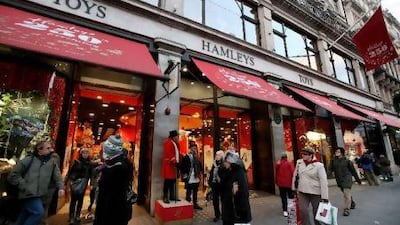Shopping has already turned into a festive frenzy in the UK - and Christmas is still 22 days away. But a big freeze is threatening to spoil the party, just as it did last year
You wouldn't know there was a cold snap, or a struggling economy, in the UK from the joyous ringing of the shops' tills at the start of the festive shopping season.
More than a million shoppers stormed London's West End over the weekend to splash out £250 million (Dh1.43 billion) on gifts and gadgets. Shops in Oxford Street and Regent Street had their strongest trading day in three years.
On Monday, millions more went online, spending £22.4m an hour. Manic Monday the media called it, the busiest shopping day on the internet that is expected to haul in £537m for retailers, up 29 per cent on the same day last year. Web shoppers are expected to spend £8bn this festive season.
It's an auspicious start to Christmas spending, but as the big freeze that has been wreaking havoc in the north heads south, will this festive frenzy turn into a damp squib?
With the scars of last winter's hazards etched on their minds, local authorities and businesses say they are more prepared this time.
Councils have put more lorries on standby to grit and clear the roads and for months companies have prepared contingency plans to keep staff working at home and customers happy.
An overnight snowstorm last February, the UK's worst in two decades, cost the economy £1.2bn. London and the south-east, where 20 per cent of the country's businesses are based, were crippled as roads were closed, trains stranded and workers failed to get to work.
"We tend to think snow won't affect us in the south-east but the experiences of last winter gave a lot of businesses a lot to think about. Our members are much better equipped simply because of those experiences," says Louise Punter, the chief executive at Surrey Chambers of Commerce.
The early cold snap across the UK made last month the coldest November in 17 years, with blizzards and temperatures plunging to as low as minus 18°C in Wales. So far, the north, north-east and south-west have borne the brunt of the freezing conditions.
Business leaders in Scotland have warned these will cost the country more than £50m a day, mostly in lost Christmas trade.
"For Scottish business this cold front could not come at a worse time," says David Greaves, a director at RSA, a global insurance company.
Forecasters say the big freeze will "continue for weeks", followed by milder weather around Christmas. Still, shopping for presents will hardly be affected, as many have the alternative to shop online, albeit a less gratifying experience.
The Christmas cheer trailed by shoppers is followed by more good news from the government this week. According to the Independent Office for Budget Responsibility (OBR), public-sector job losses will not be as high as previously thought.
The budget watchdog's November forecast now predicts that 330,000 public-sector workers will lose their jobs over the next four years, far fewer than the 490,000 it predicted in June.
The OBR has also raised its estimate for economic growth this year from 1.2 per cent to 1.8 per cent. Growth for next year, however, has been revised down from 2.3 per cent to 2.1 per cent and for 2012 down to 2.6 per cent from 2.8 per cent.
Still, there are many out there who are not taking any chances. Last week, surveys by financial websites suggested that many Britons planned to cut back on their Christmas spending this year or even "cancel Christmas" altogether because of the government's austerity drive and to stay out of debt. Last Friday, a survey by the savings provider ING Direct revealed that consumers said they would cut spending in the festive season by 10 per cent, to £490, from £548 last year.
Much as the easy spenders should be hailed for helping to boost the economy, the resolve of the cautious must be applauded. After all, with job losses, rising value-added tax and energy bills, plus changes to state benefits and the likelihood of interest rate rises, who knows what the new year will bring?

